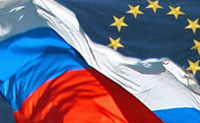Europe may not even want to improve ties with Russia at all
Vaclav Klaus, the President of the Czech Republic, chairs the delegation of the European Union at the EU-Russia summit in Khabarovsk. The Russian-speaking politician conducted successful reforms to establish capitalism instead of socialism in his country. However, the European Union sees the Czech leader as a politician who impedes the process of the European integration. Klaus has never released any anti-Russian statements, despite the problem of the notorious US missile defense system.

Klaus is considered the prime adversary of the European integration. His counterparts did not want him to chair the European Union six months ago. Vaclav Klaus refused to introduce the euro in his country. He was the only European politician, who welcomed the results of the Lisbon Treaty referendum in Ireland in 2008 (the EU Constitution thus remained unchanged).
In February, Klaus compared the European Union to the USSR, when he said that the EU had become a non-democratic structure that left no freedom of choice, similarly to communist regimes of Eastern Europe.
Vaclav Klaus is probably the most prominent politician in Europe’s former socialist camp during the recent 15 years. He became the finance minister of the Czech and Slovak Federative Republics after the collapse of socialism in 1989. Klaus became the president of the Czech Republic in 2003 and was reelected last year.
Vaclav Klaus’s reforms to change the political and economic regimes in the country were absolutely painless. Czech cars are competitive and reputable in Europe; the country’s agriculture can fully supply the nation with high-quality and inexpensive food. The Czechs do not travel to neighboring states for earnings as it happens in most of other countries of the former socialist camp. The living standard in the Czech Republic has become higher than that in Poland, Hungary and in the Baltic States.
In the beginning of the 1990s, Klaus wanted to make his country become a NATO member. However, he harshly criticized the wars in Yugoslavia and Iraq in 1999 and in 2003. He also stood up against Kosovo’s independence. He repeatedly supported the idea to deploy elements of the US missile defense system in the Czech Republic, although he did not take any efforts to give the process a go.
Klaus’s attitude to Russia has been changing periodically. He was a totally pro-Western politician in the beginning of the 1990s. As soon as he became the president, he said that he did not share anti-Russian sentiments of his predecessor, Vaclav Havel. Klaus has never said anything negative about Russia during the recent six years. When Georgia attacked South Ossetia in 2008, the Czech president stated that Georgia should not be justified for its actions.
On May 13 Klaus set out a protest against the attempts to rewrite the history of Second World War and urged other leaders not to blacken the role of the USSR and Russia in the history of the 20th century.
Vaclav Klaus can considerably improve the relations between Russia and the European Union. However, his European counterparts may not want it at all.
Vadim Trukhachev
Pravda.Ru
Subscribe to Pravda.Ru Telegram channel, Facebook, RSS!

